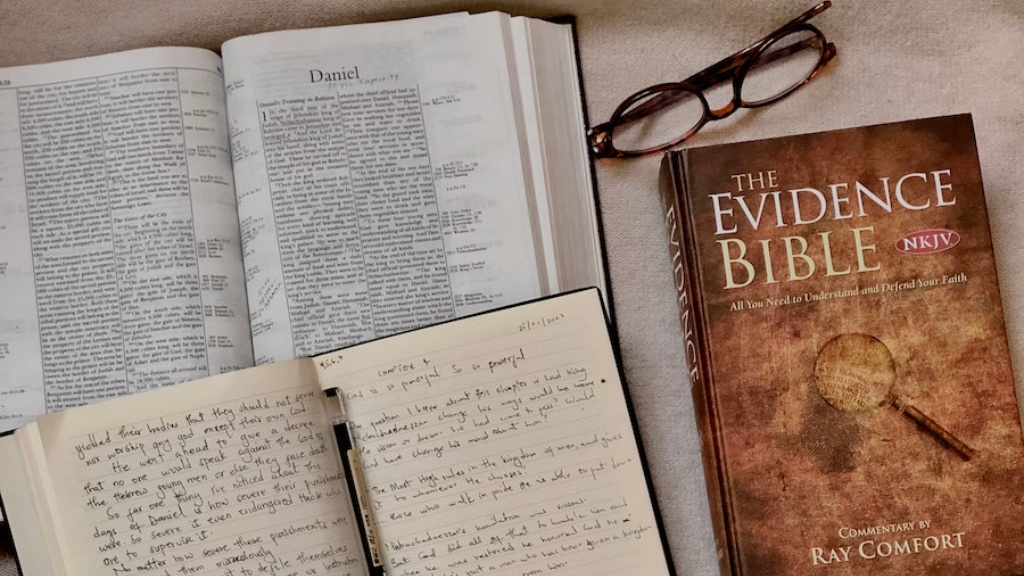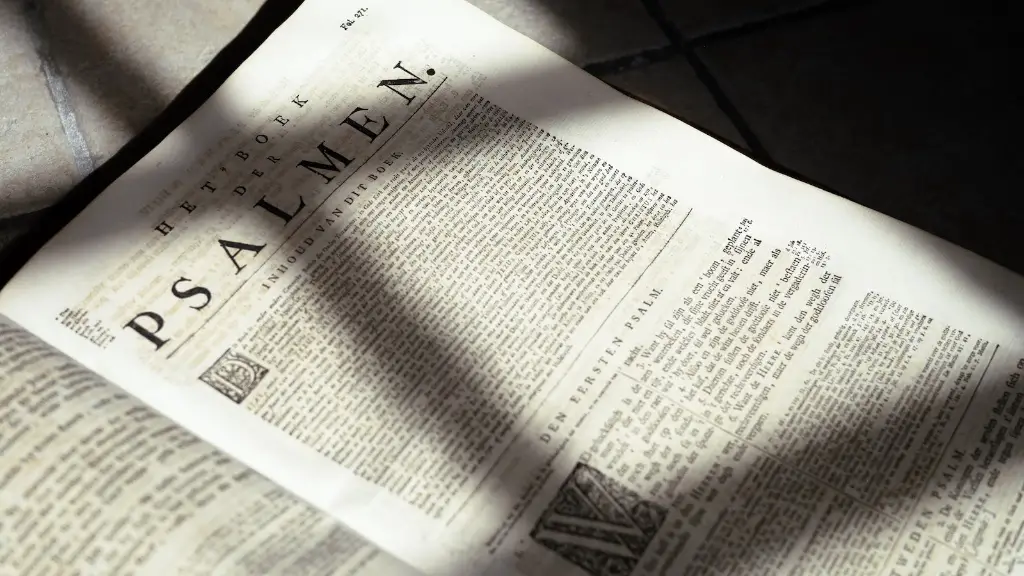What Is Free Will In The Bible?
In the Bible, free will is at the core of how humans interact with God, and many Christian denominations view free will as a foundation of Christian belief. Free will is the ability for humans to make moral decisions, and the concept has been debated for centuries. Generally, it is accepted that humans have a moral, or spiritual, capacity to set their own course and make decisions, rather than being puppets on a string of fate.
The Bible contains multiple examples of free will, many of which tout the importance of choice. In the book of Joshua, the children of Israel were commanded to choose whether to serve God or idols. Joshua 24:14-15 states, “Now, therefore, fear the Lord and serve him in sincerity and truth; and put away the gods which your fathers served on the other side of the river and in Egypt, and serve the Lord.” Further, in Matthew 22:37-40, Jesus emphasizes the importance of human choice by reciting the two greatest commandments of God, saying, “Thou shalt love the Lord thy God with all thy heart, and with all thy soul, and with all thy mind. This is the first and great commandment. And the second is like unto it, Thou shalt love thy neighbour as thyself.”
Many scholars contend that the concept of free will is an important Christian doctrine. John Calvin, who popularized the concept of predestination, argued that humans have been given a measure of free will, even if their choices are predetermined in some ways. In his Institutes of Christian Religion, he wrote, “God does whatever he pleases, but does not thereby move heaven and earth in accordance with his pleasure: rather his pleasure is expressed through the order of nature and of work and ‘life, which has been instituted, fixed and determined by him.” Similarly, contemporary theologians, such as William Lane Craig, maintain that free will is, in fact, essential to the Christian faith.
There is also the notion that free will is limited by God’s omnipotence. Thomas Aquinas, a 14th century theologian who was a major contributor to Catholic theology, argued that humans are given the ability to make choices, although these decisions are constrained by divine omnipotence. He wrote: “God’s will is the cause, while our will is the effect. Our will is thus limited by God’s will, because nothing can come to pass which He does not cause, although He is not the author of evil.”
In conversation with the idea of free will, many Christians also embrace the concept of predestination, which is the belief that God has predetermined the fate of all people. Predestination views free will as an illusion, and that all choices have already been predetermined by a divine hand. This view is taught in the New Testament book of Romans 8:29-30, in which it is written, “For God knew his people in advance, and he chose them to become like his Son, so that his Son would be the firstborn among many brothers and sisters. And having chosen them, he called them to come to him.”
God’s Sovereignty
In discussing free will in the Bible, it is important to consider the concept of God’s sovereignty. This idea of God’s omnipotence is reiterated throughout the Bible, and is a central theme of Christianity. It posits that God is sovereign over all of nature and all of humanity, and that humans are subject to His will and plans. Romans 9:21-23 states that “Doesn’t the potter have the right to make out of the same clay some pottery for special purposes and some for common use? What if God, although choosing to show his wrath and make his power known, bore with great patience the objects of his wrath—prepared for destruction? What if he did this to make the riches of his glory known to the objects of his mercy, whom he prepared in advance for glory?”
Through this passage, there is an emphasis on God’s power and mercy, and a recognition that He is at the center of all human choices. This does not mean, however, that humans can’t exercise free will. Instead, it serves as a reminder that human choices are made in concurrence with the will of God. Some scholars argue that free will is actually the expression of God’s will, since all choices are in accordance with God’s ultimate plan.
Moreover, while God’s sovereignty is emphasized in Scripture, it is not a call to abdicate responsibility for moral choices. Rather, it is a call to understand the power of those choices – which are made within the framework of God’s ultimate plan. As humans, the choices we make have importance, and they should always be made in accordance with God’s will.
Biblical examples of Free Will
In the Bible there are plenty of examples demonstrating the importance of free will. In Genesis 3, there is the story of Adam and Eve, who had the freedom to choose how to act in the garden, despite God’s warnings. Similarly, in Exodus, Moses is given the free will to choose whether to lead the Israelites out of Egypt or remain in slavery, and he chooses to lead them. In Daniel 1, Daniel freely chooses to resist corrupt leadership and worship of false idols, and in Matthew 4, Jesus is tempted in the desert but does not give in to the devil’s temptations.
These examples demonstrate that individuals have the capacity to make choices, even when those decisions may seem difficult or unpopular. The Bible is filled with stories demonstrating the importance of free will, and the power of those choices to shape the course of human events. Whether it is Adam and Eve’s fateful choice in the Garden of Eden, or Moses’ decision to lead the Israelites out of slavery, free will is depicted as a powerful, and critical, part of the human experience.
Christian Understanding Of Free Will
Overall, the concept of free will is a central element of Christianity. How one understands and interprets free will is a personal choice, and different individuals have different perspectives. In some circles, free will is viewed as something that is fully within the realm of the individual; while in other sects, it is seen as something that is pre-ordained by God. Irrespective of one’s personal viewpoint, the bottom line is that free will is an integral part of the human experience, and one that is consistently emphasized throughout the Bible.
Contemporary Debate
In modern times, the debate over free will continues to rage. In the philosophical camp, the debate centers on whether free will is a genuine phenomenon, or an illusion produced by the chaotic and unpredictable nature of the universe. In science, research is ongoing to map out the physical processes in the human brain that underlie free will. On the theological front, debate revolves around the interplay between free will and predestination.
As such, the question of free will in the Bible is ongoing. Despite centuries of disagreement, it is still accepted in some form by most Christian denominations. Some Christians view free will as an expression of God’s will, while others view it as a power in its own right; however, all recognize its importance in the Christian worldview. In Bible, free will is an overarching theme, and the power of the choices we make is underscored throughout.
Effects of Free Will
The power of free will can be seen in the many ways it manifests itself in our lives. It gives us the freedom to make choices, to shape our lives, and to influence the lives of those around us. It allows us to shape our beliefs, to make difficult decisions, and to create a meaningful life. However, it also carries with it the responsibility to make thoughtful, moral, and informed choices.
Moreover, free will is the means by which we can experience true joy and contentment. As Jesus said in John 10:10, “The thief comes only to steal and kill and destroy; I have come that they may have life, and have it to the full.” When we make conscious decisions based on thoughtfulness, love, and a desire to please God, we experience the fullness of life He intends for us. We are able to experience true contentment, because we are embracing the life that God wants us to lead.
Relevance of Free Will Today
In today’s world, the power of free will continues to be vitally important. The choices we make have a profound impact on our lives and on the world around us. We are all capable of exercising free will, and the opportunities are endless when we embrace this power to make responsible choices. Free will is the tool that allows us to choose to live a moral, purposeful life, and to be in tune with God’s will.
At the end of the day, the Bible’s perspective on free will is clear, and it serves as a reminder that our choices matter. The choices we make define our lives, and through free will, our ultimate choice is whether to live in accordance with God’s will and to serve Him with our lives. By understanding and embracing free will, we can live with purpose and joy, knowing that we are actively pursuing the path that God wants us to be on.
Final Thoughts on Free Will
Ultimately, while there is much debate in academic and religious circles surrounding free will, the concept is a central part of Christianity. Free will is the power of choice humans have been given, and it is a critical tool in living a life that is pleasing to God. In the Bible, free will is emphasized not only in moral choices, but also in its power to shape individual and collective decisions. Through understanding and embracing what free will is, people can live a life of purpose and meaning while honoring God’s will.




